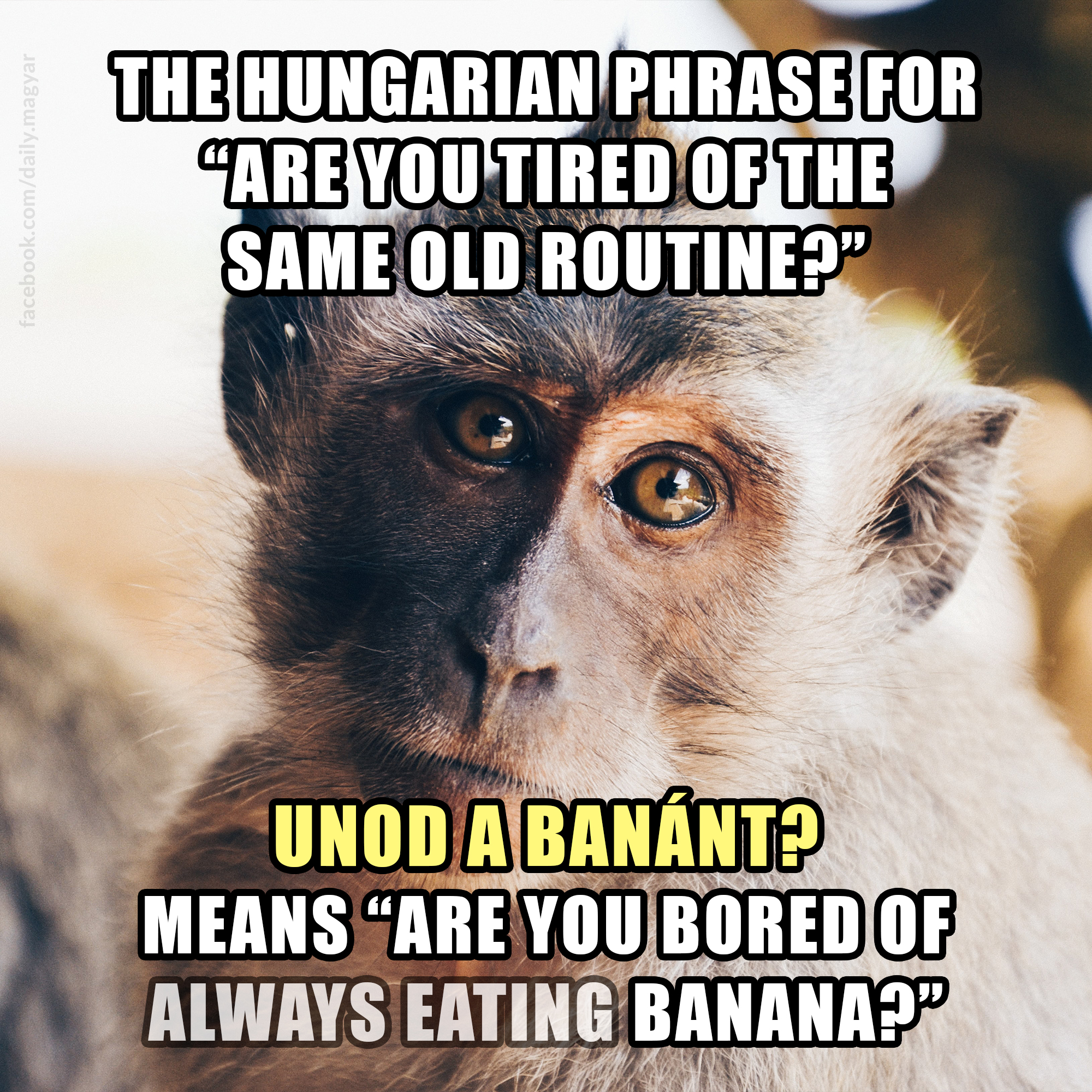
Unod a banánt? [ˈunod ɑ bɑnaːnt] 🍌 🍌 🍌
Translation: Are you bored of (always eating) banana?
Meaning: Are you tired of the same old routine?
unni [ˈunːi] – to be bored of; to be tired of; to be fed up with
unom [ˈunom] – I’m bored of / tired of / fed up with
unod [ˈunod] – you are bored of / tired of / fed up with
unja [ˈuɲːɑ] – he/she is bored of / tired of / fed up with
unjuk [ˈuɲːuk] – we are bored of / tired of / fed up with
unjátok [ˈuɲːaːtok] – you are bored of / tired of / fed up with
unják [ˈuɲːaːk] – they are bored of / tired of / fed up with
banán [ˈbɑnaːn] – banana 🍌
Photo: Des Récits (unsplash.com)
Month: October 2021
tökkelütött

tökkelütött [ˈtøkːɛlytøtː] – stupid, doltish person; imbecile; nincompoop
(Literally: a person, who has been hit/beaten with a pumpkin; hit/beaten with a pumpkin)
tök [ˈtøk]
1) cucurbita
2) squash; pumpkin 🎃
3) male genital (slang)
ütni [ˈytni]
1) to hit; to strike; to beat; to knock; to slap; to smack
2) to take after (followed by -ra/-re)
(e.g.: Apjára ütött. – He takes after his father.)
Photo: Gillian Lingard (unsplash.com)
kutacs

Még nem nőtt be a feje lágya. [ˈmeːg nɛm nøːtː bɛ ɑ fɛjɛ laːɟɑ]
Translation: His/her soft spot hasn’t closed yet.
Meaning: He/she is so immature.; He/she is acting in a childish way.
kutacs [ˈkutɑtʃ] – soft spot; fontanelle
a fej lágya [ˈfɛj laːɟɑ] – the soft spot; the fontanelle
(Literally: the soft of the head; the soft part of the head)
fej [ˈfɛj] – head
lágy [ˈlaːɟ] – soft
puha [ˈpuhɑ] – soft
benőni [ˈbɛnøːni] – to grow in; to overgrow; to close
nőni [ˈnøːni] – to grow
nő [ˈnøː]
1) he/she/it is growing
2) woman
Moziba ne vigyelek?!

Moziba ne vigyelek?! [ˈmozibɑ nɛ viɟɛlɛk]
Translation: Shall I even take you to the cinema?!
Meaning: Stop it! You’re asking for too much!
When somebody is asking a lot of things from you to do all them at once or as soon as possible, you just get tired of it and ask “Moziba ne vigyelek?!”. The phrase is rather a bit arrogant, so don’t use it with your parents. 😀
mozi [ˈmozi] – cinema 📽️
(word created by Heltai Jenő around 1907)
mozi <– mozgóképszínház <– mozgófényképszínház
mozgókép [ˈmozgoːkeːp] – moving picture; motion picture
mozgóképszínház [ˈmozgoːkeːpsiːnhaːz] – moving picture theatre
mozgófényképszínház [ˈmozgoːfeːɲkeːpsiːnhaːz] – moving photograph theatre
mozgó [ˈmozgoː] – moving; mobile
mozogni [ˈmozogni] – to move
mozog [ˈmozog] – he/she/it is moving
mozdul [ˈmozdul] – he/she/it moves
mozdulni [ˈmozdulni] – to move; to stir
mozdulat [ˈmozdulɑt] – movement
fénykép [ˈfeːɲkeːp] – photograph
fény [ˈfeːɲ] – light; shine
kép [ˈkeːp] – picture; image; frame
filmszínház [ˈfilmsiːnhaːz] – movie theatre; cinema
színház [ˈsiːnhaːz] – theatre; theater; playhouse
szín [ˈsiːn]
1) color
2) scene; play (also as ‘színdarab’)
ház [ˈhaːz] – house
Photo: Jake Hills (unsplash.com)
vizslat

vizsla [ˈviʒlɑ] – Hungarian dog breed 🐕
vizslat [ˈviʒlɑt] – he/she/it is seeking / searching for something for a long time, repetitively (like a vizsla); he/she/it is ferreting about; he/she/it is scanning
vizslatni [ˈviʒlɑtni] – to seek / searching for something for a long time, repetitively; to ferret about; to scan
vizsgálni [ˈviʒgaːlni] – to investigate; to examine; to analyse; to check 🕵️
vizsgál [ˈviʒgaːl] – he/she investigates/examines/checks
vizsga [ˈviʒgɑ] – exam; test